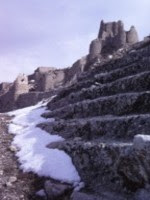News from Hypocristan
What is there to think about stories like the one below? Ahmet Davutoglu, the Foreign Minister of Turkey, stands up before a microphone and says something so totally, so stupidly, so demonstrably untrue that one can only gape and wonder if he will be Oscar-nominated as Best Actor in a Supporting Role.
Here's the background. A Turkish dramatic series presented on a state-run television channel shows Israeli troops deliberately shooting at and killing Palestinian children. Israel cries foul. Ahmet Bey says, "But Turkey does not censor." This of course is false. A quick look at the comments following the linked article will show the American reader just a few of the many media outlets that have been banned by the Turkish authorities, from YouTube to the works of Richard Dawkins. But the real question is, Why does the Turkish government continue to act this way? Why do they blandly tell these lies? Why do they promote their police state to the world as a "vibrant democracy"? Having just gone through the Bush II Administration, and faced with the ever-burgeoning popularity of such beings as Glenn Beck and Rush Limbaugh, Americans are in no position to give themselves a pass on this. (Think of how many times George W. Bush claimed he didn't say something that he was quite plainly videotaped saying.) But there's something so Turkish about the blandness with which Turkish government officials put out these statements about their own uprightness and morality. Contrast this with the American style. Tad Friend, writing about Hollywood in 12 October 2009 edition of The New Yorker, says,
"Hollywood's leaders work with the understanding that facts are not fixed pillars but trial balloons that you inflate with the gas of vehement assertion."The gas of vehement assertion. How I wish that I had written that phrase. How I wish that I could buy some of that and put it in my car. It could run forever.
Davutoğlu: Turkey is not a country that censorsThe final stroke, the smack to the forehead, comes in the Comment form at the end of the article. Note:
ISTANBUL – Daily News with wires Friday, October 16, 2009
Foreign Minster Ahmet Davutoğlu on Friday responded to complaints from Israel about the depiction of Israeli armed forces in a Turkish television series on a state-run channel. “There is no censorship in Turkey,” Davutoğlu said in a press conference Friday before he departed for Bosnia, according to broadcaster CNNTürk. “TRT [Turkish Radio and Television Corporation] is an autonomous institution. The television series’ producers are also an independent company. It is not in the ministry’s mandate to advise them.”
He criticized Israel as the actual source of tension, referring to the country’s attack on Gaza last year. “Turkey has been working toward creating peace in the region, and it was Israel that put our chances of creating peace at risk by attacking Gaza.” He cited women and children suffering the most from the incidents. He recalled that Turkey was mediating between Israel and Syria last year, but said, “We will not be silent about what happened in Gaza,” according to the Anatolia news agency. The Israeli ambassador to Turkey was expected to visit the Foreign Ministry later Friday to express his government’s concerns about the television series.
"Submitted comments must be approved by Daily News staff to ensure they are in accordance with Turkish law. Comments that violate Turkish law will not be published."And Orwell laughs again.
Labels: Turkey



